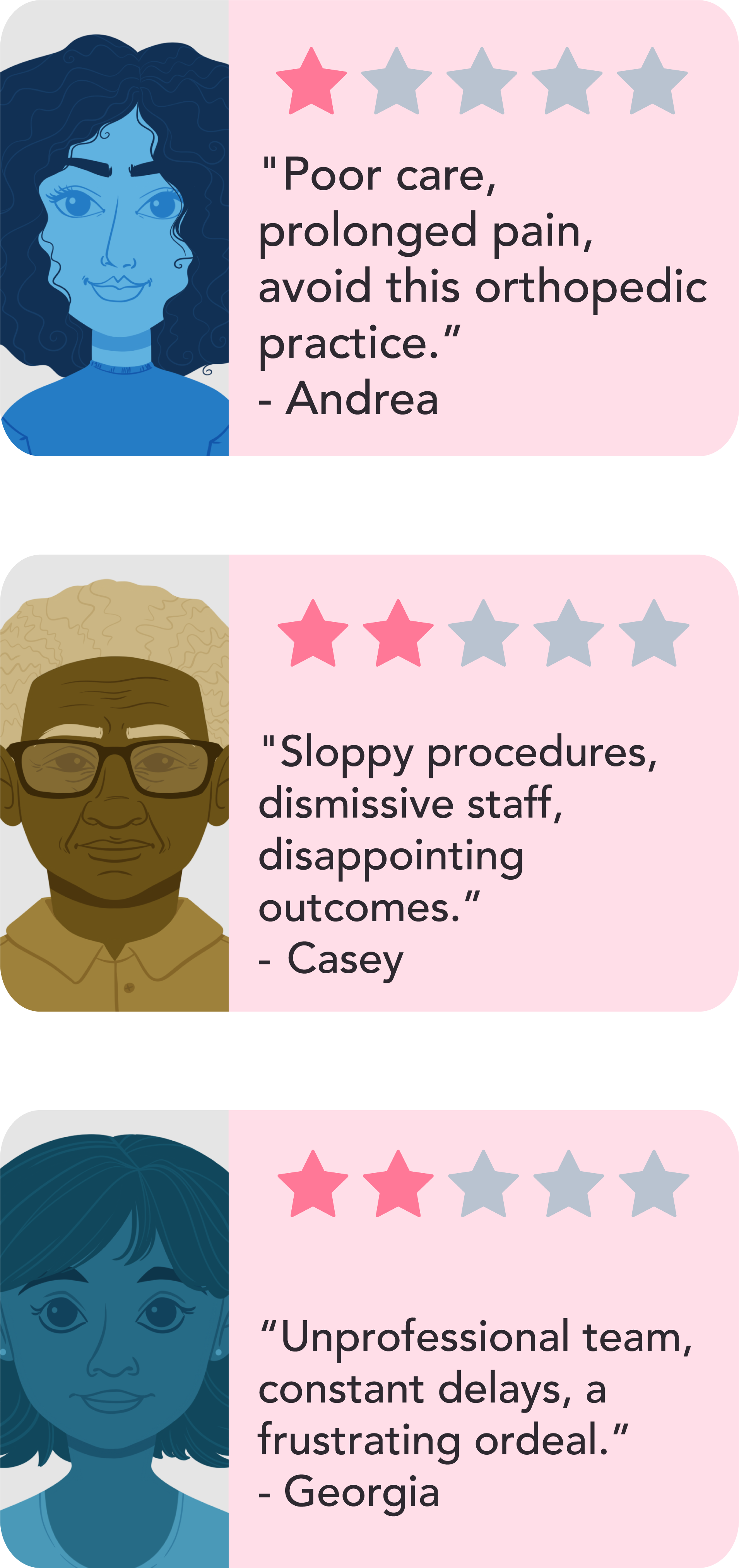With digital transformation reshaping patient behavior and engagement in the fast-paced healthcare industry landscape, a pivotal question emerges: should you prioritize your online reputation or invest in your website optimization?
The dilemma has healthcare providers scratching their heads, especially considering many are trying to catch up with contemporary healthcare marketing strategies they have long been cautious about due to HIPAA restrictions. While this decision might not be simple, it’s undeniably critical to your success.
Reputation Management is Indispensable to Healthcare Marketing
In healthcare, where trust and patient safety are paramount, reputation is everything. No matter how well-designed and meticulously optimized for UX, SEO, and conversions your website is, it won’t perform if your healthcare practice’s reputation is poor (or even not quite good) or—perish the thought!—non-existent. Today, online reputation acts as word-of-mouth recommendations, with potential patients scouring the internet for reviews—and Google reviews often being their first and most trusted stop.
Reputation can make or break you—but it’s not as simple. Patients will often consider practices with ratings above 4.0, but once you’ve met that crucial condition, various other factors come into consideration. Location, insurance compatibility, working hours, and availability all come into play. The common thread weaving through these factors is simply—convenience.
So, What’s Convenience for Healthcare Consumers?
Convenience: an ever-evolving concept in a digitally-driven society. Did you know that roughly 96% of patients say they have already booked a medical appointment online or would if the option were available? You may think—oh, yes, kids today do everything on their phones. Well, brace yourself, for 92% of boomers claimed the same. 
Today’s consumers are accustomed to instant gratification, and this expectation translates into healthcare too—and why shouldn’t it, considering it costs them dearly? They want simple interactions with as few clicks as possible and swift information access. For you, this isn’t simply a matter of preference—but rather of aligning your practice with the expectations of your patients.
This prompts us to suggest that you should strive to provide a simple and efficient online scheduling solution for your patients. While you may build this within your website, you can also explore the options offered by your trusted reputation and local SEO allies: Google Business Profile and Apple Business Connect, or other cost-effective third-party platforms.
Are Your Website Optimization and Your SEO Performance Inextricably Chained?
Yes… And no.
When in need of healthcare, most users turn to their phones and use “near me” queries on their maps app or Google to find the best solution. This is where local SEO comes into play: optimizing your online presence for local search can significantly impact your clinic’s foot traffic.
Conveniently (for you, this time!), reputation management aligns seamlessly with your local SEO efforts: Google Business Profile and Apple Business Connect are your gateway both into reputation and local SEO. Managing these listings comprehensively and on a regular basis can bring dual success: you’ll be easily found online and highly acclaimed by your previous patients.
While location, and, therefore, local SEO, are among the determining decision-making factors when it comes to routine check-ups and minor medical needs (due to, again, convenience), when patients require major surgery or treatment for more serious health issues, they’ll go to greater lengths to get the greatest care possible.
“So, We Don’t Need Website Optimization Then?”
We didn’t say that. (You can see how it gets complicated.)
To continue where we left off: patients seeking more complex procedures will do thorough research to make the best decision possible and strive for peace of mind—and rightfully so, as sometimes these decisions may carry their lives at stake. This is where a well-designed, comprehensive, and optimized website can be the difference-maker. Finding detailed information about the procedure, your doctors, and other valuable information will reassure your potential patients, establish trust, and put you on top of their minds.
These high-value patients, seeking significant procedures that often translate to more revenue for your clinic, can significantly impact your bottom line. But here’s the catch: the true value lies in those online conversions. This is where a well-optimized landing page can become crucial for your healthcare organization.
What Makes a High-Converting Healthcare Landing Page?
So, what’s an ideal landing page in the healthcare marketing context? It’s where the magic of self-scheduling happens.
This page streamlines the appointment process, allowing patients to select their preferred doctor, department, time, and date. It seamlessly syncs with your scheduling system, presenting available slots in real-time. On top of that, this landing page features an impeccable user experience, ensuring clarity in form fields, intuitive buttons, and transparent confirmation messages that leave no patient confused. Security is paramount, especially when handling patients’ private data.
This landing page isn’t just a tool; it’s a testament to your commitment to patient-centric care.
An effectively built landing page can help you boost your efforts across all digital healthcare marketing channels: from advertising to social media and third-party listings.
Reputation Management vs. Website Optimization: How Do You Choose?
Now that we’ve established all that, the (somewhat clearer) question remains: when to prioritize reputation management and when to focus on your website optimization?
In an ideal situation, you wouldn’t have to choose at all, but let’s try to break down this dilemma so that you can make a decision that’ll boost your healthcare marketing ROI and make decision-making simpler.
When to Choose Healthcare Reputation Management
 Finally, something is quite straightforward:
Finally, something is quite straightforward:
- If your online reputation is lacking or non-existent, prioritize it immediately. Patients are likely to trust others’ experiences over your website’s claims. It may surprise you, but a 4.3 rating based on 1000 reviews easily beats a 5.0 rating based on 10 reviews.
- If your reputation is not great (and anything below 4.0 is not considered great), invest in fixing it as soon as possible. A subpar reputation can and will inspire patients to explore competitors.
Once your reputation picks up, start including other healthcare marketing elements. Reputation management tools can help you automate this process, ensuring consistent review collection and management, therefore freeing up resources for other marketing activities and allowing you to build or optimize your website sooner rather than later.
Ultimately, improving your reputation will directly influence your bottom line, bringing in more money to invest in your healthcare marketing efforts.
When to Invest in Website Optimization
- If your reputation is solid (above 4.0) and reviews are consistently positive, consider directing attention to your website. A strong reputation instills trust, and a well-optimized website seals the deal. This doesn’t mean you should abandon your reputation management, it simply means you already got it right—keep it up!
- If your website is very outdated or doesn’t exist at all, address these issues to avoid turning potential patients away. Consider a simple, well-optimized one-pager that provides essential information and an easy-to-use self-scheduling form. This might even bring you and your patients more benefits than a robust website that’s complex to navigate. Plus—HIPAA already makes it hard to track website performance, so why further complicate your life?
Remember, an impressive reputation might bring them to your digital doorstep, but an outdated website could show them out.
Reputation Management vs. Website Optimization: Is There A Compromise?
Navigating the dilemma of reputation management and website optimization doesn’t have to be a binary choice. Finding the right balance is a smart way forward, catering to both the immediate and long-term marketing needs of your healthcare practice.
Rather than funneling colossal resources into an extensive website overhaul, start with a strategic investment. Choose a simple landing page that allows for a simple information overview and self-scheduling to establish an online touchpoint that promotes a patient-centric experience, and invest the rest of your dedicated budget in reputation management. Within the healthcare marketing niche, outdated websites are all too common—so even incremental website fixes can go a long way and make you stand out from the competition.
In case you’re neither here nor there, making a compromise and applying these combined efforts can bring in more healthcare marketing ROI and establish a stronger future marketing budget that will, hopefully, relieve you from making such difficult choices.
In the ever-evolving healthcare landscape, understanding the distinct roles of reputation and a well-optimized website can help you create a synergy that drives patient acquisition and retention. In a world of choices, where digital experiences shape perceptions, it’s crucial to make the right ones. A comprehensive healthcare marketing platform can help you streamline your efforts, automate now mundane marketing tasks, and collect crucial performance data in a HIPAA-compliant manner. SocialClimb can help you measure your healthcare marketing KPIs and let the numbers make the hard decisions for you.











